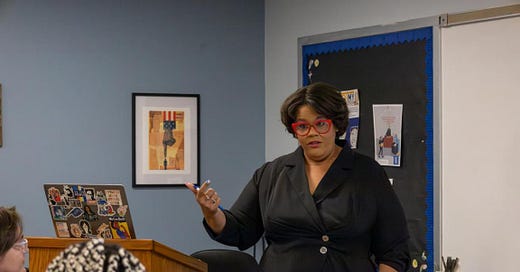Hope for democracy in GOVT 101
I wrote something, just published in Commonweal, about what's *really* going on politically on campus
I have a new feature article in Commonweal about college students and politics. I hope you will read it, share it, discuss it, etc. That is the main takeaway of this post: Please read the essay. You can access it for free, no account required.
The chief merits of this story include:
it is based on actual reporting — about 15 in-depth interviews, in-person observation, physical travel, that sort of thing
that reporting was done at ordinary colleges and universities in the middle of the country, not at the Ivy League
Here is how it begins:
Last April, I traveled to Rose State College, a community college a few miles outside Oklahoma City, to sit in on political-science professor Emily Stacey’s class, American Federal Government. The course is required of every undergraduate at a public institution in the state, whether they major in public affairs or dental hygiene. The day I visited would be the culmination of several weeks of students’ research and collaboration: a policy debate.
For many students, the class is not only an orientation to the U.S. government but to understanding themselves as political persons. “A lot of these kids don’t have nearly as much inclination towards politics as perhaps we’re seeing portrayed in the media,” Stacey told me. So she administers the Pew Research Center’s political typology survey to help them become aware of where they stand on the political spectrum.
On the debate day, the twenty-two students sat at three tables, each representing a political leaning: liberal, conservative, and independent. The liberal group was the largest. As class began, a woman at the independent table, a bit older than most of her classmates, suggested strategies and talking points. At the conservative table, a student pulled on a new sport coat over his T-shirt and shorts; his classmates poked fun at him for leaving the price tag on it.
After a few minutes, Stacey announced, “Alright, it’s 9:35. Let’s get it on!”
As the first paragraph indicates, I started this piece a looooong time ago — the olden days of spring 2024. As the news cycle turned many, many times, I worried that the story would no longer seem relevant once it was published. Haha, well: we can put that worry to bed.
Much has been written over the past year about students and politics. Some of it has been good, but most of it has not. Most has been armchair analysis done by people who aren’t looking beyond elite universities. It’s been, “Oh look, a thing happened at Stanford (or wherever); it must mean something!”
Very few students go to elite universities. Indeed, that’s what makes them elite. These universities are influential in our society. I think they’ve done a lot of good for society. Just in my article, toward the end, I cite two scholars, one from Princeton, one from Harvard. It’s good that we have Princeton and Harvard in our society.1
But if you want to assess what college students are up to, you can’t just look at the elite schools.
Think about it for a moment: What do you know about the political inclinations of students at your nearest regional state university? If you live in Michigan, I’m not talking about UM. I’m talking about Eastern Michigan University. What do New Yorkers know about student politics at SUNY Potsdam or Buff State? What do you know about the politics of students at your local community college?
Everyone claims to know what students are like, politically. But they don’t know, because few people bother to find out what ordinary students at ordinary colleges think. The consequences of this pseudo-knowledge, this knowingness (there I go again), are enormous. Medical research in the U.S. is right now being set back years because people with power — and the people who put them in power — were so certain they knew what colleges and their students were all about. The country as a whole will suffer for the sake of this false certitude.
The story is appearing at a moment when my own faith in American democracy is about as low as it’s ever been. This wasn’t the case when I started the piece, but, you know, things have changed. Maybe I wrote it to convince myself. I have done this before.
One other merit to the article: the photojournalism by Annie Davenport, who is a student at the University of Oklahoma. I love that Commonweal hired a student photographer to help tell this story! The leading Substack “news sources” rarely if ever hire photographers or illustrators to do original work to complement their articles. Old-style print magazines do. They are worth a subscription. A one-year print + digital subscription to Commonweal costs $25 US. For that, you get a far, far better product than you’ll get from two opinion writers who never leave their desks.
A final note: I forgot to recommend, in my last post, John Miller’s new book, The Last Manager: How Earl Weaver Tricked, Tormented, and Reinvented Baseball. The book has been a New York Times best-seller. If you like baseball, read it. John, a former baseball scout and reporter for the Wall Street Journal, took one of my spiritual nonfiction classes a couple years ago. I don’t think I taught John anything he didn’t already know, but I can at least brag a little bit about his tremendous accomplshment, right?!
Duke is another story; we can do without Duke.



